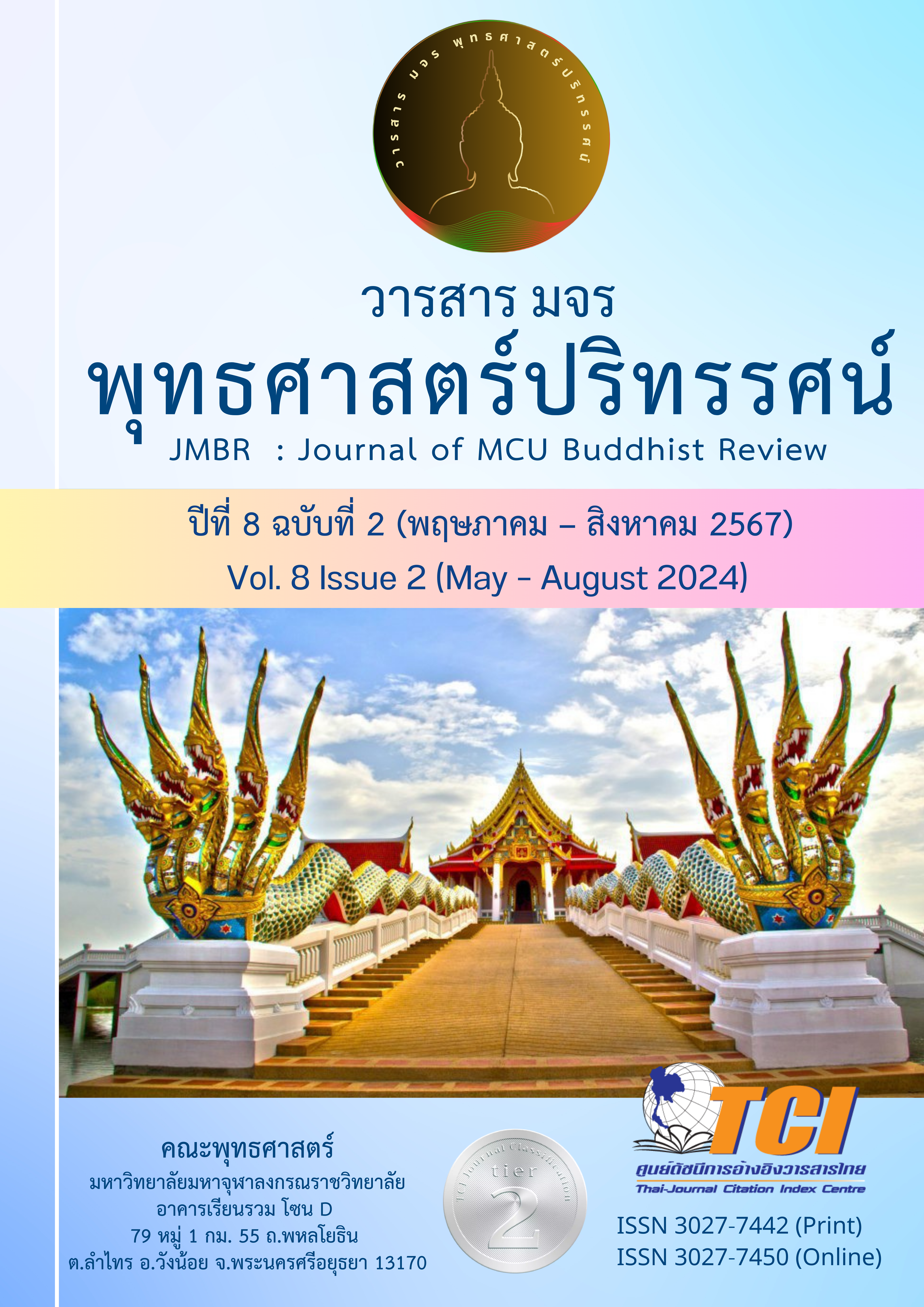Application of Mindfulness Meditation with Dhamma Song For Senior Practitioner: A Case Study of Buddhamahametta Foundation, Chiangrak Noi, Phra Nakhon Si Ayutthaya
Main Article Content
บทคัดย่อ
This research article has three objectives as follow: 1) To study the practice and the problem of Mindfulness meditation for senior practitioners. Case Study Of Buddhamahametta Foundation, Chiangrak Noi, Phra Nakhon Si Ayutthaya. 2) To study the mindfulness meditation with Dhamma song according to music therapy for senior practitioners. Case Study Of Buddhamahametta Foundation, Chiangrak Noi, Phra Nakhon Si Ayutthaya And 3) To apply the mindfulness meditation with Dhamma Song for senior practitioners. Case Study Of Buddhama- hametta Foundation, Chiangrak Noi, Phra Nakhon Si Ayutthaya. This research is utilizing a mixed-method research approach, combining Quasi-Experimental and Qualitative Research methodologies, by selecting the sampling group of 16 key informants from the population who are senior practitioners and attended one day mindfulness meditation course at Buddhamahametta Foundation. The research tools are the questionnaire of the Thai Mental Health Indicator – 15 (TMHI – 15) which submitted to the sampling group before and after taking the one-day mindfulness meditation course and in-dept interview to collect the answer covering the objective of the research. After successfully collecting and organizing the data from the questionnaires, the research team utilized statistical software for social science analysis to examine the pre-test and post-test results related to mental health. Additionally, the data analysis for in-depth interviews was conducted using content analysis techniques to interpret the information gathered. To ensure quality, statistical methods such as the dependent T-test and Wilcoxon Signed Ranks Test were employed to compare the mean values of mental health outcomes in the qualitative research.
The result of research can be found that 1) The results highlighted the physical sensations and mental suffering experienced by some individuals, particularly the elderly or those with physical discomfort. These challenges include difficulties with mobility, sitting for extended periods, and maintaining focus during activities such as meditation. 2) Practicing mindfulness meditation with Dhamma songs can enhance relationships within families and communities, as well as improve both physical and mental health. Senior practitioners find that engaging in mindfulness meditation, guided by the lyrics of Dhamma songs, provides comfort and helps them connect more deeply with the teachings of the Buddha. 3) The application of mindfulness meditation with Dhamma songs significantly improved the mental health of senior practitioners, embracing these practices with consistency and readiness, practitioners can experience numerous benefits, including enhanced mental well-being and deeper spiritual connections.
Article Details

อนุญาตภายใต้เงื่อนไข Creative Commons Attribution-NonCommercial-NoDerivatives 4.0 International License.
- บทความที่ได้รับการตีพิมพ์เป็นลิขสิทธิ์ของวารสาร มจร พุทธศาสตร์ปริทรรศน์
- ข้อความใดๆ ที่ปรากฎในบทความที่ได้รับการตีพิมพ์ในวารสาร ถือเป็นความรับผิดชอบของผู้เขียนบทความ และข้อคิดเห็นนั้นไม่ถือว่าเป็นทัศนะและความรับผิดชอบของกองบรรณาธิการวารสาร มจร พุทธศาสตร์ปริทรรศน์
เอกสารอ้างอิง
Brown, M. (2018). Mindfulness Meditation: A Self-Awareness Approach to Weight Manage- ment. Doctoral dissertation of Nursing Practice. Walden University.
Byers, K. L. (2012). A Philosophical Inquiry of Music Therapy: Seeking Points of Unification. Doctoral dissertation of Music. The University of Western Ontario.
Jiwattanasuk, N. (2021). A Process of Development For Peaceful Well-Being of Meditation Practitioners Through Buddhist Peaceful Means: A Case Study of Buddhamahametta Foundation, Chiang Rak Noi, Phra Nakhon Si Ayutthaya. Doctoral dissertation of Philosophy (Peace Studies). Mahachulalongkornra-javidyalaya University.
Abby K. (2022). 9 Benefits of Music Therapy. Choosing Therapy. Retrieved 20 October 2022 from https://www.choosingtherapy.com/benefits-of-music-therapy/
Thera. N. (1994). Satipatthana Sutta: The Foundations of Mindfulness. Retrived 3 January 2024 from https://www.accesstoinsight.org/tipitaka/mn/mn.010.nysa.html
Payton, R. (2019). Music Therapy Effects on Social-Communicative Response of Children with Autism Spectrum Disorder. Doctoral dissertation of Education. Walden University.
Román, L. (2022). Effects of music on well-being and mental-health. Research Work. University of Barcelona.
Thorsen, S. et al. (2013). The predictive value of mental health for long-term sickness absence: the Major Depression Inventory (MDI) and the Mental Health Inventory (MHI-5) compared. BMC Medical Research Methodology. 13(115), 1-3.
Zarate, R. (2012). The Sounds of Anxiety: A Quantitative Study of Music Therapy and Anxiety. Doctoral dissertation of Philosophy. Lesley University.


